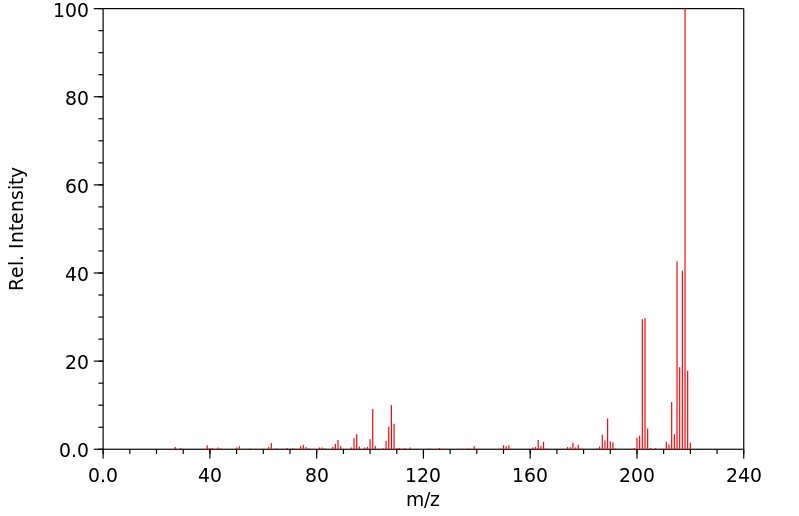1,10-trimethylenephenanthrene | 4389-09-7
中文名称
——
中文别名
——
英文名称
1,10-trimethylenephenanthrene
英文别名
5,6-Dihydro-4H-benzanthracen;5,6-dihydro-4H-benzo[de]anthracene;5,6-dihydro-4H-benzo[a]phenalene
CAS
4389-09-7
化学式
C17H14
mdl
——
分子量
218.298
InChiKey
VFZDNSWGNPSQLY-UHFFFAOYSA-N
BEILSTEIN
——
EINECS
——
-
物化性质
-
计算性质
-
ADMET
-
安全信息
-
SDS
-
制备方法与用途
-
上下游信息
-
文献信息
-
表征谱图
-
同类化合物
-
相关功能分类
-
相关结构分类
物化性质
-
熔点:154 °C
-
沸点:418.4±15.0 °C(Predicted)
-
密度:1.168±0.06 g/cm3(Predicted)
计算性质
-
辛醇/水分配系数(LogP):5.3
-
重原子数:17
-
可旋转键数:0
-
环数:4.0
-
sp3杂化的碳原子比例:0.18
-
拓扑面积:0
-
氢给体数:0
-
氢受体数:0
上下游信息
-
上游原料
中文名称 英文名称 CAS号 化学式 分子量 2,3-二氢-1H-萉 perinaphthane 479-58-3 C13H12 168.238 —— 5,6,8,9,10,11-hexahydro-4H-benzo[a]phenalene 28740-43-4 C17H18 222.33 -
下游产品
中文名称 英文名称 CAS号 化学式 分子量 —— 7-bromo-5,6-dihydro-4H-benz[de]anthracene 681215-15-6 C17H13Br 297.194
反应信息
-
作为反应物:描述:1,10-trimethylenephenanthrene 在 四(三苯基膦)钯 氢氧化钾 、 4 A molecular sieve 、 溴 、 cesium fluoride 作用下, 以 四氯化碳 、 二氯甲烷 、 N,N-二甲基甲酰胺 为溶剂, 反应 31.5h, 生成 二苯并(A,L)芘参考文献:名称:二苯并具有高度缩合成[ DEF,P ]屈(chrysene)及其12甲氧基衍生物,密钥前驱体对二苯并[的近端和最终致癌物的合成DEF,P ]屈摘要:二苯并[ def,p ]丙烯(DBC)(1)是迄今为止鉴定出的最具致突变性和毒性的多环芳烃。它的代谢活化导致反式-11,12-二羟基-11,12-二氢-DBC(2)进一步代谢为最终的代谢产物,反-反式-11,12-二羟基-13,14-环氧-11 ,12,13,14-tetrahydro-DBC(3),与DNA结合导致突变并最终诱导肿瘤。我们报告了合成DBC(1)及其12-甲氧基衍生物(12-methoxy-DBC)(13)(合成2和3的关键中间体)的简便方法,使用Suzuki交叉耦合方法。DOI:10.1021/jo0303822
-
作为产物:描述:2,3-二氢-1H-萉 在 platinum on activated charcoal 盐酸 、 三氯化铝 、 汞 、 锌 作用下, 生成 1,10-trimethylenephenanthrene参考文献:名称:Rahman,A. et al., Australian Journal of Chemistry, 1972, vol. 25, p. 1521 - 1527摘要:DOI:
文献信息
-
The monomethyl and dimethyl derivatives of benzo[e]pyrene作者:Hongmee Lee、N. Shyamasundar、Ronald G. HarveyDOI:10.1016/s0040-4020(01)98957-4日期:1981.1claim16 that the analogous isomeric benzo[a]pyrene derivatives are principal products of reactions of this type is disproven. Synthesis of 3,6- and 4,5-dimethylbenzo[e]pyrene are also described. The structural assignments of all mono- and dimethyl benzo[e] pyrene products are supported by high resolution 270 MHz proton NMR spectra; the chemical shifts and coupling constants of all aromatic protons are描述了苯并[e] py的六种异构单甲基衍生物,1-,2-,3-,4-,9-和10-甲基苯并[e] py的先前未知的完整集合的便利合成。1-,2-和3-甲基苯并[e] py的合成是通过7H-苯并蒽(或其适当的1-Me衍生物)与1,3-双(二甲基氨基)三甲亚甲基高氯酸盐(或其1-Me)反应完成的衍生物),然后进行热电环闭合,并进行消除和芳构化。较早的索赔16证明类似的异构体苯并[a] py衍生物是这类反应的主要产物。还描述了3,6-和4,5-二甲基苯并[e] py的合成。高分辨率270 MHz质子NMR谱支持所有单和二甲基苯并[e] pyr产物的结构分配;所有芳族质子的化学位移和偶合常数均已完全赋值。
-
Deacylation-aided C–H alkylative annulation through C–C cleavage of unstrained ketones作者:Xukai Zhou、Yan Xu、Guangbin DongDOI:10.1038/s41929-021-00661-7日期:——on the aromatic core and a tethered alkyl moiety provides a straightforward approach to access these scaffolds; however, such a strategy is often hampered by the need of special reactive groups and/or less compatible cyclization conditions. It would be synthetically appealing if a common native functional group can be used as a handle to enable a general C–H annulation with diverse aromatic rings.
-
Benzylic oxidation with 2,3-dichloro-5,6-dicyanobenzoquinone in aqueous media. A convenient synthesis of aryl ketones and aldehydes作者:Hongmee Lee、Ronald G. HarveyDOI:10.1021/jo00153a030日期:1983.3
-
Chemistry of the Oxo and Related Reactions. IV. Reductions in the Aromatic Series<sup>1</sup>作者:Irving Wender、Harold Greenfield、Milton OrchinDOI:10.1021/ja01150a069日期:1951.6
-
Pupils' views of the role and value of the science curriculum: A focus-group study作者:Jonathan Osborne、Sue CollinsDOI:10.1080/09500690010006518日期:2001.5Pupils' perceptions of their experience of school science have rarely been investigated. The aim of the research reported in this paper, therefore, was to document the range of views that pupils held about the school science curriculum, the aspects they found either interesting and/or valuable, and their views about its future content. As such, the research aimed to articulate their views as a contribution to the debate about the future form and function of the school science curriculum. The method adopted to elicit their views was to use focus groups-a methodology that has not been extensively used in the science education research. Reported here are the findings from 20 focus groups conducted with 144 16-year-old pupils in London, Leeds and Birmingham, split both by gender and whether the pupils intended to continue, or not, with the study of science post-16. The findings of this research offer a window into pupils' perspective of school science revealing both their discontents and satisfaction with the existing curriculum. On the negative side, many pupils perceived school science to be a subject dominated by content with too much repetition and too little challenge. From a more positive perspective, pupils saw the study of science as important and were engaged by topics where they could perceive an immediate relevance, practical work, material that was challenging and high-quality teaching. The implications of these findings and the insights they provide for curriculum policy and school science curricula are discussed.
表征谱图
-
氢谱1HNMR
-
质谱MS
-
碳谱13CNMR
-
红外IR
-
拉曼Raman
-
峰位数据
-
峰位匹配
-
表征信息
同类化合物
(R)-2,2'',3,3''-四氢-6,6''-二-9-菲基-1,1''-螺双[1H-茚]-7,7''-二醇
(6,6)-苯基-C61己酸甲酯
高雌二醇
马兜铃酸钠
马兜铃酸盐
马兜铃酸C
马兜铃酸B
马兜铃酸(1:1MIXTUREOFARISTOLOCHICACIDIANDARISTOLOCHICACIDII)
马兜铃酸 Ia
马兜铃酸 IVa
马兜铃酸
颜料黑32
颜料红179
颜料红178
颜料红149
颜料红123
顺式-菲-1,2-二醇-3,4-环氧化物
顺式-苯并(a)屈-11,12-二醇-13,14-环氧化物
雷公藤酚A
镁二(1,4,5,6,7,16,17,18,19,19,20,20-十二氯六环[14.2.1.14,7.02,15.03,8.09,14]二十-5,9,11,13,17-五烯-11-磺酸酯)
钩大青酮
钩大青酮
钙(2+)12-羟基十八烷酸酯
酒石酸布托诺啡
那布扶林
还原红32
足球烯
贝那他汀B
贝母兰素
萘并[2,3-b]荧蒽
萘并[2,1-e][1]苯并二硫杂环戊烷
萘并[2,1-C:7,8-C']二菲
萘并[1,2-e][2]苯并呋喃-1,3-二酮
萘并[1,2-b]屈
萘并[1,2-a]蒽
萘并[1,2-B]菲-6-醇
萘二(六氯环戊二烯)加合物
萘,8-溴-1,2,3-三(1,1-二甲基乙基)-6-甲基-
菲醌单缩氨基硫脲
菲醌
菲并[9,10]呋喃
菲并[9,10-e]醋菲烯
菲并[4,5-bcd]噻吩
菲并[4,5-bcd]呋喃-3-醇
菲并[4,3-d]-1,3-二噁唑-5-羧酸,10-羟基-9-甲氧基-6-硝基-
菲并[3,2-b]噻吩
菲并[2,1-d]噻唑
菲并[2'',1'',10'':4,5,6;7'',8'',9'':4',5',6']二异喹啉并[2,1-a:2',1'-a']二萘嵌间二氮杂苯-8,13-二酮
菲并(3,4-b)噻吩
菲并(1,2-b)噻吩








